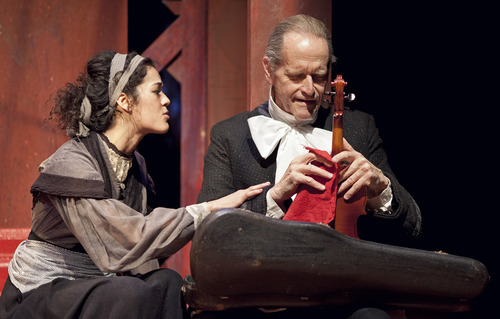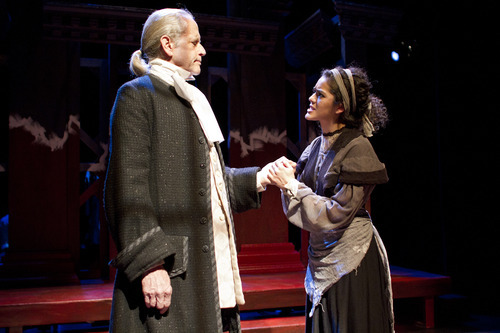This is an archived article that was published on sltrib.com in 2012, and information in the article may be outdated. It is provided only for personal research purposes and may not be reprinted.
Racial politics are one reason more than 10 years lapsed between the first and final drafts of Debora Threedy's play "The Third Crossing."
Threedy, a professor of law at the University of Utah S.J. Quinney College of Law, focused her play on President Thomas Jefferson's relationship with his slave Sally Hemings, whom historians believe carried Jefferson's children.
"What I ran up against was the fear that it wasn't my place to tell the story," Threedy said, explaining why the script sat in her desk drawer so long. "Who was I as a white woman from middle America to tell it?"
Race is so fundamental to the story of America, and all Americans, that everyone has the right to tell her own story about it, she finally determined, which led her to finishing the play.
"The Third Crossing" is a grave, but also inventive work. And as a play about interracial relationships through the lens of U.S. history, it's easy to see why it must hold both qualities in balance. The script won the New York City-based Castillo Theatre's 2010 Fratti-Newman Political Play Contest and will receive its world premiere in a production by Plan-B Theatre Company, opening this week at the Rose Wagner Performing Arts Center.
Among the cast are local actors David Fetzer as Hemings' oldest son, Beverly; Kalyn West as Hemings; DeeDee Darby Duffin as Hemings' mother, Betty; and University of Utah theater professor Bob Nelson as Thomas Jefferson.
"This is a complex, nuanced and in many ways painful play, but it's extremely important," Nelson said. "Jefferson's words have articulated what we aspire to as a nation, yet he himself fell so far short of the ideals he professed. My approach is to assume that all his brilliance and inconsistencies are all there simultaneously. He's complex, like we all are."
Apart from Jefferson's business records, few facts are known about Hemings. Threedy created her character after years of research but also, she said, out of whole cloth for purposes of constructing a drama.
As a play about race, the script raises questions about fear, hatred, resentment and, at the edges, even some humor. "The Third Crossing" is also about race itself, drawing on a 1998 DNA study that linked Jefferson descendents to Hemings' son Eston and sent shock waves through historical reputation of a key Founding Father.
The play takes its name from a breeding process that crosses a black person with white mates until dark skin pigment is erased from the offspring— a "third crossing" that results in a pigment that lets someone "pass" as white.
The concept of passing compelled Threedy to consider the whole notion of race. What does it mean to be white if you have black parents, and what good is the concept of race in a world that becomes smaller every day?
While Jefferson's relationship with Hemings marks the play's beginning, it doesn't occupy its end. Threedy progresses through history to the historic U.S. Supreme Court case of Loving vs. Virginia, which ended legal barriers to interracial marriage in 1967, and on toward the 1980 shooting by Joseph Paul Franklin of two black men jogging with white women in Salt Lake City's Liberty Park.
But Jefferson's relationship with Hemings, plus the children they brought into the world, remains the center of Threedy's script. Throughout, the character of Hemings, portrayed by West, expresses feelings of love and resentment toward her master that alternate between consent and violation.
Threedy's play hints at moments when race as an operative idea can be as liberating as it is oppressive.
"There's an element of justification going on in her mind as a survival mechanism," West said. "A lot of plays with messages can cross the line and become uncomfortable and brittle to the point that they turn people off. This play has a very loving way with its subject matter. By the end, it guides us to its point, rather than shoves us."
Twitter: @Artsalt
Facebook.com/nowsaltlake —
Sally's story
Plan-B Theatre Company presents Debora Threedy's "Third Crossing."
When • March 8-18. Thursdays and Fridays, 8 p.m.; Saturdays, 4 and 8 p.m.; Sundays, 2 p.m.
Where • Plan-B Theatre Company at the Rose Wagner Performing Arts Center's Studio Theater, 138 W. 300 South, Salt Lake City.
Info • $10-$20 at 801-355-ARTS or planbtheatre.org







